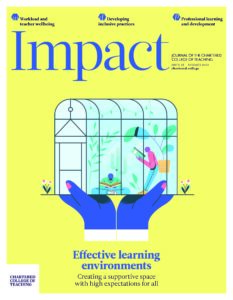Motivation for learning in an asynchronous environment: Oak National Academy in action
Written by: Katie Marl

7 min read
Katie Marl, Curriculum Manager, Education Team, Oak National Academy, UK
Oak National Academy was created in April 2020 to support teachers and students during lockdowns caused by the coronavirus pandemic. It hosts over 10,000 lessons, covering the entire National Curriculum for students aged four to 16, and includes 600 lessons for pupils with specialist needs. We’ve been through several lesson-production cycles and learned a lot along the way. We embed our findings into subsequent lesson production.
Oak partnered with ImpactEd to understand the impact that Oak National Academy’s resources had over the spring and summer terms of the 2020–21 academic year, reflecting on usage of Oak both during partial school closures and following full pupil returns (Impact Ed 2020/21 Evaluation Report, July 2021). The findings of this report will be referred to throughout this article and consisted of a mixed methods approach: a quantitative survey with 911 participants, qualitative inter
Join us or sign in now to view the rest of this page
You're viewing this site as a guest, which only allows you to view a limited amount of content.
To view this page and get access to all our resources, join the Chartered College of Teaching (it's free for trainee teachers and half price for NQTs) or log in if you're already a member.
- Allen J, Gregory A, Mikami A et al. (2013) Observations of effective teacher–student interactions in secondary school classrooms: Predicting student achievement with the classroom assessment scoring system –secondary. School Psychology Review 42(1): 76–98.
- Duckworth AL, Quinn PD and Seligman ME (2009) Positive predictors of teacher effectiveness. The Journal of Positive Psychology 4(6): 540–547.
- Guo PJ, Kim J and Rubin R (2014) How video production affects student engagement: An empirical study of MOOC videos. In: Proceedings of the first ACM conference on Learning@ scale conference, March, pp. 41–50.
- Impact Ed (2021) Oak National Academy 2020/21 Evaluation Report. Available at: https://assets.ctfassets.net/ygggx3rcdvia/71qzpQA2MqlkvDs5OEDCv4/1d3ba8ab1743e40c167d6cdab3fc398c/Oak_Evaluation_Report_-_FINAL_Sept_2021.pdf (accessed 20 April 2022).
- Jang H (2008) Supporting students’ motivation, engagement, and learning during an uninteresting activity. Journal of Educational Psychology 100(4): 798.
- Katzir M, Emanuel A and Liberman N (2020) Cognitive performance is enhanced if one knows when the task will end. Cognition 197: 104189.
- Lemov D (2020) Teaching in the Online Classroom: Surviving and Thriving in the New Normal. Hoboken, NJ: John Wiley & Sons.
- Lovell O (2020) Sweller’s Cognitive Load Theory in Action. Woodbridge: John Catt.
- Mccrea P (2020) Motivated Teaching: Harnessing the Science of Motivation to Boost Attention and Effort in the Classroom. California: CreateSpace Independent Publishing Platform.
- Nuutila K, Tuominen H, Tapola A et al. (2018) Consistency, longitudinal stability, and predictions of elementary school students’ task interest, success expectancy, and performance in mathematics. Learning and Instruction 56: 73–83.
- Reeve J, Jang H, Carrell D et al. (2004) Enhancing students’ engagement by increasing teachers’ autonomy support. Motivation and Emotion 28(2): 147–169.
- Rosenshine B (2012) Principles of instruction: Research-based strategies that all teachers should know. American Educator 36(1): 12–19, 39.
0
0
votes
Please Rate this content
Subscribe
Please login to comment
0 Comments
Inline Feedbacks
View all comments










